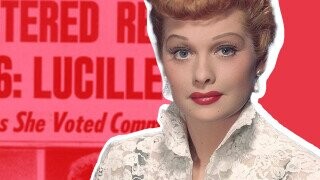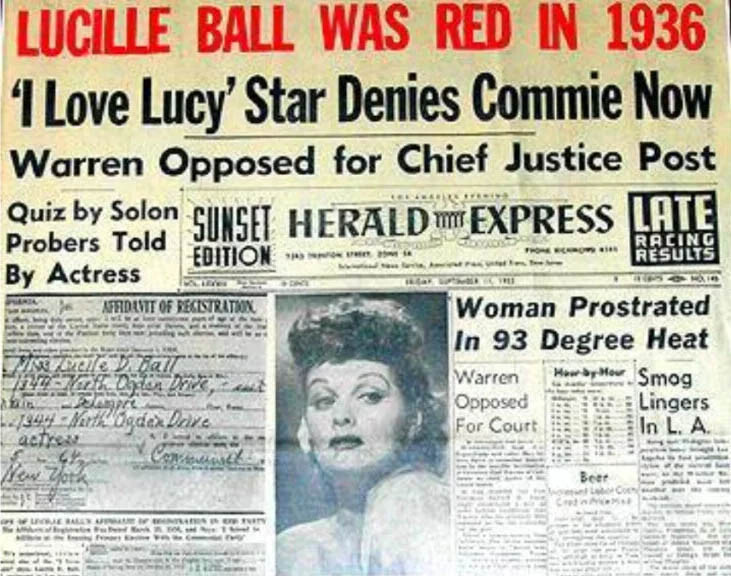How Comedy Helped Bring Down Joe McCarthy and the Hollywood Black List

Being the Ricardos might have taken some liberties with the facts (one historian we know says J. Edgar Hoover calling into a taping of I Love Lucy was “utter bullshit”), but Desi Arnaz did indeed take the stage in 1953 to defend “my favorite wife, my favorite redhead. In fact, that’s the only thing red about her. And even that’s not legitimate!”

Los Angeles Herald-Express
In the 1950s, Lucille Ball was just one of America’s comedy stars who found themselves labeled “red,” a supposed sympathizer with the Communist party and therefore an insidious enemy of the United States. It was more than a slur. Whether it was the House Un-American Activities Committee (HUAC) or Senator Joseph McCarthy, painting a Hollywood actor with a crimson brush effectively ended careers. Let’s look at how hysterical lawmakers targeted some of America’s biggest comedy stars — and how comedy fought back.
Lucille Ball
There were few bigger celebrities in 1953 than Ball. That season, a staggering 67.3 percent of TV viewers watched I Love Lucy, a number the major networks combined couldn’t reach today. But that didn’t stop HUAC from tapping Ball on the shoulder when a scandal sheet reported that she had registered as a Communist in 1936.
“We did it to please Daddy,” Lucy explains in her autobiography, Love, Lucy. “Daddy” (an aging leftist who was Lucy’s grandfather) had recently suffered a stroke and Lucy, along with other family members, appeased him by registering with his party of choice. She never voted during those years, communist or otherwise, and the registration lapsed by 1938. Still, she appeared before HUAC in a closed meeting and testified, “I am not a Communist now. I never have been.” Both the FBI and the congressional committee cleared her, but the gossip columnists caught wind and let the headlines fly.

New York Daily News
Arnaz tried to make things right with his “my wife’s no pinko commie spy!” speech to I Love Lucy’s studio audience, more or less captured by Being the Ricardos. (Apparently, it was Ball’s daughter, Lucie Arnez Luckinbell, who provided the apocryphal story that Hoover cleared her mom via a phone call.)
But according to Thomas Doherty, a professor at Brandeis University and author of Show Trial: Hollywood, HUAC and the Birth of the Blacklist, Ball was never really in that much trouble (and that J. Edgar call was baloney). “Everybody loved Lucy so she could sail above it,” he tells me. Of course, it didn’t hurt that “she was making so much money for the tobacco industry,” that Philip Morris essentially took her side with the government. But not all 1950s sitcom stars were as beloved or above consequences. Take, for example…
Phillip Loeb
Because The Goldbergs (not that one) was produced in the days before videotape made syndication possible, the early 1950s comedy is mostly forgotten now. But the show the BBC calls “TV’s first family sitcom” was a massive hit. The Goldbergs starred Gertrude Berg as the family matriarch, sweet, assertive and meddling in the manner of Ball and other comedy wives of the era. Her exasperated husband, Jake, was played by Phillip Loeb — at least until he was labeled a Communist by Red Channels, a right-wing journal looking to take down treasonous entertainers. Seriously? Does this guy look like he’s about to overthrow the government?

Wiki Commons
Despite Loeb’s ties to nefarious labor unions like the socialist thugs over at the Screen Actors Guild, he was no threat to any government, here or abroad. But Loeb had nowhere near Ball’s stature, and despite his denials about being a Communist, sponsor General Foods demanded his firing. Berg refused to sack her leading man, leading to CBS canceling her show in 1951. Loeb eventually resigned, and the show was only picked up by NBC after Loeb was replaced by a new actor.
“He’s out of work on television and he hustles around on Broadway for a while, but he’s not getting jobs,” explains Doherty. Finally, in 1955, a depressed Loeb commits suicide in a lonely hotel room. “He’s really a tragic character of the blacklist.”
Even more tragic? In researching Loeb’s FBI file, Doherty discovered a note from the special agent who’d been following the actor, recommending that surveillance stop because the harmless Loeb was no security risk. “And that memo,” says Doherty, “was dated a week before Phillip Loeb commits suicide.”
Charlie Chaplin
The Little Tramp was in cahoots with Communists, at least in the eyes of a few FBI agents, so that made him a possible security risk. In actuality, says Doherty, he was what Trotsky termed a “fellow traveler,” someone who generally agreed with the Community party line but wasn’t a formal member.
HUAC subpoenaed Chaplin in 1947 for its original round of hearings, and he was all too happy to show up. After all, he had a new movie, Monsieur Verdoux, coming out at the same time and he thought it would be great publicity. But the committee’s chairman, J. Parnell Thomas, had second thoughts. “Chaplin was just such a huge superstar that he would have overshadowed the committee and probably made it a laughingstock,” says Doherty.
@charleschaplin_
Chaplin was uninvited, but even without that hearing, he still felt the effects of the Red Scare. After flying to London to promote his film, J. Edgar Hoover worked with immigration services to make sure Chaplin couldn’t re-enter the U.S. Hoover even had MI5 spy on the comedy film star, although the agency determined Chaplin was just another progressive lefty who posed little threat to anyone.
The U.S. ban continued, however, leading Chaplin to make a new home in Switzerland. “I have been the object of lies and propaganda by powerful reactionary groups who, by their influence and by the aid of America’s yellow press, have created an unhealthy atmosphere in which liberal-minded individuals can be singled out and persecuted,” said Chaplin in one of his few talkie appearances. “I find it virtually impossible to continue my motion-picture work, and I have therefore given up my residence in the United States."
Comedy Fights Back
Ball, Loeb and Chaplin are just three of the funny people whose careers were marred by political gossip-mongering. But ironically, it was comedy of the early 1950s that may have helped hasten the downfall of McCarthy and his baseless accusations of subverting mom, apple pie and the rest. After all, what better way to deflate a pompous ass than to subject him to public ridicule? One of the first voices with the nerve to take on McCarthy was, unsurprisingly, Mad Magazine.

Mad Magazine
Harvey Kurtzman, with the help of artist Jack Davis, took dead aim at McCarthy, now bug-eyed, manic Senator Joseph McCartaway. “Kurtzman drew a bead on the phony aspects and idiosyncrasies of modern commercial culture,” wrote Denis Kitchen and Paul Buhle in The Art of Harvey Kurtzman: The Mad Genius of Comics. “He took on Senator Joseph McCarthy as surely and seriously in the pages of Mad as Edward R. Murrow did on television.”
The Mad parody not only called out McCarthy for his dishonesty but also shone a light on how the emerging medium of television “allowed the rabble-rouser to rule the national stage,” according to The Nation. In the Mad version of the world, McCarthy and friends were simply performing for the cameras, providing malicious entertainment in the time provided by their commercial sponsors. Politics was just another TV show, suggested Kurtzman, which was a revolutionary idea at the time.
Other cartoonists joined in. The term “McCarthyism,” in fact, was coined by the Pulitzer Prize-winning political cartoonist Herblock in this memo to conservatives. Hey guys, it’s time to find a less shaky platform.

Library of Congress
Soon, comics of all stripes were joining the mockery parade. Stan Freberg and Daws Butler created “Point of Order,” a parody of McCarthy’s bombastic catchphrase during his televised hearings. The legal eagles at Capitol, Freberg’s record label, were nervous and called Freberg in for a chat. When asked whether he had ever belonged to any group that might cause trouble, Freberg admitted, "I am, and have been for a long time, a card-carrying member of... the Little Orphan Annie Fan Club of America." The lawyers were reportedly not amused.
Radio geniuses Bob and Ray chimed in as well, creating a goofy McCarthy stand-in, “Commissioner Carstairs,” as a character in their soap opera spoof Mary Backstayge.
Even our allies to the north got in on the mockery. The Canadian Broadcasting Company radio network brought the laughs with The Investigator, whose lead character was clearly satirizing McCarthy. The show had a fan in President Dwight D. Eisenhower, who reportedly enjoyed chuckling at the recording during cabinet meetings.
Groucho Marx and Red Skelton took their shots at McCarthy, too, but you knew you were really losing points with conservative America when Bob Hope joined in. During a Christmas special, Hope joked that Santa Claus let McCarthy know he was going to wear his red suit despite the Red Scare. What was McCarthy going to do, cancel Hope’s USO tours?
All of the pointed joking was “a sign that McCarthy’s influence was flagging,” explains Doherty. But what was the rubber chicken and what was the egg? Did McCarthy’s eventual decline make it safe for comedians to joke? Or did the pointed comedy cause people to take McCarthy less seriously, blunting his influence?
“That’s a good question,” says Doherty. More likely, it was a combination of both, with comedians both leading the charge against McCarthy and his ilk while also simply expressing the public’s growing disdain for fear-mongering. It also didn’t hurt that Edward R. Murrow was criticizing McCarthy on television, “opening the door for more voices of opposition.”
McCarthy himself made it easy for comedians with his increasingly over-the-top histrionics, an easy lampoon target for comics like Freberg and the Canuck yucksters behind The Investigator. In some ways, we might have McCarthy to thank for the topical cold opens we see on Saturday Night Live today — poking the good senator in the eye coincided with the launch of a new era of political humor where no Kennedy, Nixon or Ford was safe from satire.